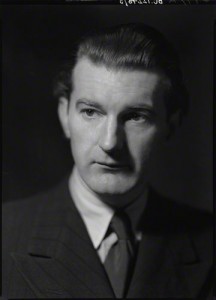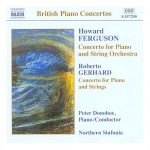 Philip Christian Darnton (1905–1981), now known principally as the author of the handbook You and Music, has long remained one of the more shadowy figures in the British musical renaissance. His tantalisingly brief and infrequent appearances in studies of other composers almost give him the status of a ‘contemporary legend’ (to borrow the subtitle of his opera, Fantasy Fair). My doctoral thesis was the first full-scale attempt to establish Darnton’s place in his own time and ascertain his position in the twentieth century as a whole. His remarkable life encompassed contributions to left-wing theatre, contemporary propaganda, British and Canadian documentary films, a creative partnership with the poet Randall Swingler, a number of literary portrayals in the works of Nigel Balchin and a working relationship with many of the most significant composers of the last century, including Berners, Britten, Alan Bush, Lambert, Lutyens, Rawsthorne and Stravinsky. Darnton’s single-mindedness in pursuing his course against much incomprehension added a gritty determination to his life. During the middle period of his work, adherence to left-wing principles convinced him to adapt his style to encourage a greater understanding by the masses, but otherwise his music was generally crafted with a ruthless logic and little concession to audiences.
Philip Christian Darnton (1905–1981), now known principally as the author of the handbook You and Music, has long remained one of the more shadowy figures in the British musical renaissance. His tantalisingly brief and infrequent appearances in studies of other composers almost give him the status of a ‘contemporary legend’ (to borrow the subtitle of his opera, Fantasy Fair). My doctoral thesis was the first full-scale attempt to establish Darnton’s place in his own time and ascertain his position in the twentieth century as a whole. His remarkable life encompassed contributions to left-wing theatre, contemporary propaganda, British and Canadian documentary films, a creative partnership with the poet Randall Swingler, a number of literary portrayals in the works of Nigel Balchin and a working relationship with many of the most significant composers of the last century, including Berners, Britten, Alan Bush, Lambert, Lutyens, Rawsthorne and Stravinsky. Darnton’s single-mindedness in pursuing his course against much incomprehension added a gritty determination to his life. During the middle period of his work, adherence to left-wing principles convinced him to adapt his style to encourage a greater understanding by the masses, but otherwise his music was generally crafted with a ruthless logic and little concession to audiences.
 In addition to rare material generously made available by Darnton’s immediate family and the pivotal holdings of the British Library, other material has also come to light from international collections and I hope to publish these findings in due course. However, a substantial number of Darnton’s manuscripts are lost, destroyed or otherwise unavailable, while several more are incomplete, existing in short score at best. Very few of his works were published, while performances and broadcasts were never frequent, since his political views often prevented further dissemination. There is therefore much work still to be done if Darnton’s music is to enjoy any sort of revival, although it was good to see that even Classic FM magazine ran a feature on him in May 2011 (albeit not entirely for musical reasons!). I shall always be delighted to hear from anyone with personal reminiscences of the composer or other relevant information, since I am sure that other manuscripts of his are still extant — somewhere.
In addition to rare material generously made available by Darnton’s immediate family and the pivotal holdings of the British Library, other material has also come to light from international collections and I hope to publish these findings in due course. However, a substantial number of Darnton’s manuscripts are lost, destroyed or otherwise unavailable, while several more are incomplete, existing in short score at best. Very few of his works were published, while performances and broadcasts were never frequent, since his political views often prevented further dissemination. There is therefore much work still to be done if Darnton’s music is to enjoy any sort of revival, although it was good to see that even Classic FM magazine ran a feature on him in May 2011 (albeit not entirely for musical reasons!). I shall always be delighted to hear from anyone with personal reminiscences of the composer or other relevant information, since I am sure that other manuscripts of his are still extant — somewhere.
 The one CD of Darnton’s music that is currently available is, in fact, the first commercial recording of any of his works. Peter Donohoe’s scintillating account of the 1948 Concertino in C (Naxos 8.557290 — the composer is only listed on the reverse of the packaging) was a most auspicious start and it is high time that others continued the investigations. Three other performances of Darnton’s work may occasionally be encountered in the form of private recordings of BBC broadcasts: these have not been released commercially but surface now and then on YouTube and the like: the Concertino played by Joseph Cooper with the Riddick String Orchestra in 1962; the Concerto for Orchestra (1973) with the BBC SO under Sir Colin Davis in 1976; and the Fourth Symphony (1978, subtitled Diabolus in musica or ‘Twenty-Minute Symphony’) by the BBC NSO under Sir Edward Downes in 1981. During the summer of 1951, Darnton was one of seven composers who assisted Lambert with the orchestration of the latter’s Tiresias, which may be heard on Hyperion CDA67049. If anyone encounters other Darnton recordings, particularly of the Third Symphony (1944), which received much praise and several broadcasts in 1945 and 1946, I should be most grateful if they would contact me.
The one CD of Darnton’s music that is currently available is, in fact, the first commercial recording of any of his works. Peter Donohoe’s scintillating account of the 1948 Concertino in C (Naxos 8.557290 — the composer is only listed on the reverse of the packaging) was a most auspicious start and it is high time that others continued the investigations. Three other performances of Darnton’s work may occasionally be encountered in the form of private recordings of BBC broadcasts: these have not been released commercially but surface now and then on YouTube and the like: the Concertino played by Joseph Cooper with the Riddick String Orchestra in 1962; the Concerto for Orchestra (1973) with the BBC SO under Sir Colin Davis in 1976; and the Fourth Symphony (1978, subtitled Diabolus in musica or ‘Twenty-Minute Symphony’) by the BBC NSO under Sir Edward Downes in 1981. During the summer of 1951, Darnton was one of seven composers who assisted Lambert with the orchestration of the latter’s Tiresias, which may be heard on Hyperion CDA67049. If anyone encounters other Darnton recordings, particularly of the Third Symphony (1944), which received much praise and several broadcasts in 1945 and 1946, I should be most grateful if they would contact me.
More about Darnton’s genealogy here
The quotation on the banner of this website is taken from Darnton’s incidental music to Polyphemus (c.1944), a pastoral mime for puppet theatre to an extraordinary scenario by Robert Nichols, for which Darnton provided a witty and high-spirited score that includes a fugue for three owls.